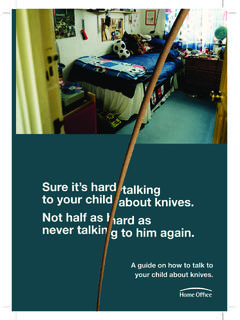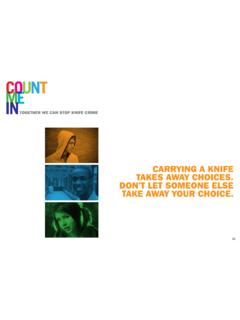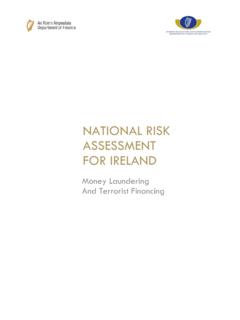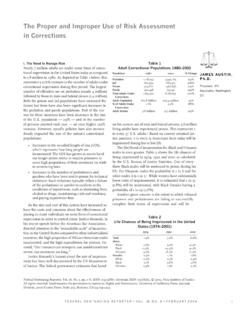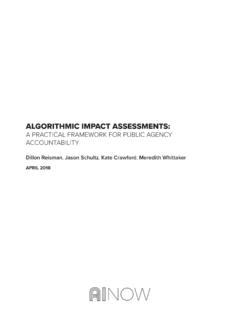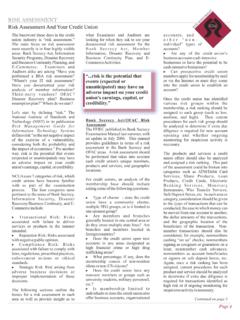Transcription of Tackling Youth Knife Crime
1 Tackling Youth Knife Crime . PRACTICAL ADVICE foR PoLICE. Ministerial Foreword Thanks to effective policing and partnership working in local areas, Knife Crime remains a rare occurrence on our streets. However, we must continue to improve how we work together so that we can drive Knife Crime down further still. Knife Crime is a serious Crime . In 2007/08, about a third of all homicides involved a sharp instrument and among those aged 19 years and under, the number of sharp- instrument homicides doubled between 2005/06 and 2007/08. We must continue to target the most vulnerable groups through effective multi-agency work. When implemented properly, multi-agency work can tackle Knife Crime effectively.
2 For example, when the police and local hospital in Cardiff worked together to share data on hospital admissions for Knife wounds, the targeted policing which this information enabled led to a reduction of 40% in accident and emergency admissions with Knife wounds. The benefits of this partnership were felt by all groups who were party to it. I would like to thank those who played a key role in the Tackling Knives Action Programme (TKAP) from the outset. DAC Alf Hitchcock, ACC Bob Evans and the 14. forces worked impressively hard towards the aim of reducing the number of deaths and serious injuries caused by Knife Crime . Having seen the successes of TKAP we are now moving into Phase 2 under the leadership of Chief Constable Keith Bristow (Association of Chief Police Officers (ACPO) Strategic Lead) and Assistant Chief Constable Susannah Fish (ACPO.)
3 Operational Lead). In March 2009 we announced an extra 5 million to tackle Knife Crime and increase targeted police action to address the minority of young people who commit serious violence, regardless of the weapon involved. We have also expanded the programme from the 13 19 age group to 13 24 and increased the number of areas involved from 14 to 16. This guidance uses learning from TKAP and police forces to identify approaches to multi-agency working to target those 13 24-year-olds most at risk of becoming Knife Crime victims or offenders. Rt Hon. Alan Johnson MP. Home Secretary 1. Contents Overview 5. Section 1: Understanding your Youth Knife Crime problem 11.
4 : Engaging partners to establish a multi-agency strategy 11. : Strategic Assessments 12. : Problem Profiles 13. : Information gathering and data sharing 14. : Community engagement 15. : Youth consultation mechanisms 16. : Hospital attendance data 17. Section 2: Planning your response 21. : Who should be involved? 21. : Sharing personal information 21. : Activity mapping 22. : Working in partnership with the third sector 23. : Your strategic response 23. Section 3: Enforcement 25. : Trading Standards and Test Purchase Operations 26. Section 4: Prevention 31. : Safer School Partnerships 36. : Working with third sector groups 36. : Advertising and awareness campaigns It Doesn't Have to Happen' 38.
5 : Risk management 39. : Operation Staysafe 41. : Common Assessment Framework 42. : Schools offering access to extended services 42. : Positive activities 43. : Targeted support for parents and families 43. : Youth Inclusion Programmes 43. : Youth Inclusion and Support Panels 44. : Knife Possession Prevention Programmes 44. : Family Intervention Projects 44. 3. Tackling Youth Knife Crime : Contents Section 5: Reassuring the community, witnesses and victims 47. : Reassuring your community 47. : A strategic framework for communicating with the public 48. : Developing communications for a critical incident 48. : High-visibility policing 49. : Use of the media 49.
6 : Reassuring victims and witnesses and restorative justice 49. : Witnesses 49. : Victims 50. : Restorative justice 50. Section 6: Resources and other useful information 53. 4. Overview introduction How this guide can help We are determined to get knives off our streets. The guide will help police to engage with key partners One incident is one too many. including: the local community;. The Tackling Knives Action Programme (TKAP) was developed by the Home Office, working closely with Crime and Disorder Reduction Partnerships (CDRPs). other government departments and key stakeholders and Community Safety Partnerships (CSPs);. including local government, police forces, community children's services, schools, colleges and Safer School groups and practitioners in affected local areas.
7 Partnerships;. TKAP will sustain and build on existing cross- health services; and government and community work; this includes the trading standards. lessons learned and success achieved by the Tackling Gangs Action Programme and Youth Crime Action This guide will help you to: Plan (YCAP) to reduce the number of teenagers killed or seriously wounded and increase public confidence share and use available data effectively;. that our streets are safe. identify an emerging Knife -carrying population/ Knife The first phase of TKAP was launched by the Prime Crime problem;. Minister and Home Secretary on 5 June 2008. In the first identify the range of partners you should work with in nine months we focused nearly 7 million of resources your area; and on rapid, concentrated work to tackle teenage Knife Crime in 14 areas of the country.
8 Consider options for Tackling the problem (including prevention-based, targeted work with at-risk In March 2009 TKAP was extended for a further year, individuals, risk assessment, mediation, enforcement with an extra 5 million to tackle Knife Crime and and community reassurance). increase targeted police action to tackle the minority of young people who commit serious violence, regardless The nature and extent of Knife Crime varies across of the weapon involved. England and Wales, so the approaches discussed in this guide are not prescriptive. The guide reflects learning TKAP has been extended to include 13- to 24-year-olds from around the country and is designed to be used as a (previously 13- to 19-year-olds), and to a further two starting point for developing strategies to address your forces, taking the total to 16 forces.
9 This work runs local issues. alongside the Youth Crime Action Plan. Copies of this guide and further case studies of effective practice are available from: 5. Tackling Youth Knife Crime : Overview Background to the Tackling Knives The vast majority of young people are law-abiding and Action Programme make a positive contribution to their communities, but TKAP was set up in June 2008 to tackle Knife crime1 in the minority who are involved in Crime and anti-social 10 police force areas and was expanded to 16 areas, behaviour have a devastating impact. The 100 million including the British Transport Police, in March YCAP has a triple-track approach of: better prevention.
10 The programme recognised that partnership working at local and national level is crucial to Tackling Knife Crime . more support to address the underlying causes of Enforcement alone cannot solve this problem, and only poor behaviour; and through a partnership approach can we crack down on tough enforcement. Knife Crime in the short term and, more importantly, put in place longer-term solutions. In working with partners, the police need to ensure that Tackling Knife Crime work is aligned with broader Youth TKAP has sent out a clear message: if you carry a Knife Crime activity. This means ensuring that YCAP initiatives you are now more likely to get caught, be prosecuted and such as Family Intervention Projects, Operation Staysafe, receive a tough punishment.


